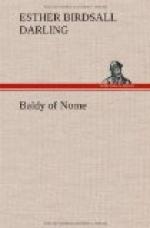“Dogs and boys never growl at me, because I love them; and he does not look as if he really had a leg to stand on,” she replied smilingly. But the boy nervously persisted. “Please let him go—his legs is all right. He looks kind o’ run down jest now ’cause he”—the boy felt a tightening at his throat, and winked hard to keep the tears from starting again—“‘cause he ain’t got much appetite. But when he’s eatin’ good his legs is jest great. Why, there ain’t no other dog in Golconda that’s got as strong legs as Baldy when he’s—when he’s eatin’ good,” he repeated hastily. “An’ Golconda’s plumb full o’ fine dogs.”
“If that’s so,” said “Scotty,” “I think I shall have to take a look at those Golconda wonders before the winter fairly sets in; and maybe you can give me a few pointers.”
For a mile or so the boy sat spellbound, drinking in the casual comments of “Scotty” upon the dogs in the team, as if they were pearls of wisdom dropping from the lips of an Oracle. He was not so much interested in the Woman’s replies, for they displayed a lack of technical information that contrasted unfavorably in the boy’s mind with the keen and accurate insight that Allan showed in every word on that most vital subject.
Vaguely the boy remembered having once heard that she had become a partner in the racing team for mere amusement of the sport, instead of from a serious, high-minded interest, and that of course did not entitle her to the same respect you could feel for one to whom the care and culture of the dog assumed the dignity of a vocation. Then, too, she had spoken slightingly of Baldy’s legs. As a human being he could not but respond to her friendly overtures, but as a dog fancier she held no place in his esteem.
As they approached the divide where the trail for Golconda branched from the main road, an idea suddenly came to the boy. He had watched the harmony between Allan and his dogs; had noted their willingness, their affection for “Scotty,” and his consideration for them. And as the pace became slower, and he realized that they were nearly at the end of this fate-given interview, he tremblingly gasped out the question that had been seething through his mind with such persistence. “Mr. Allan, would you like to buy Baldy?”
“Buy Baldy!” exclaimed the man in surprise. “Why, I thought you and Baldy were chums—I had no idea he was for sale.”
“He wasn’t till jest now, not till I saw how yer dogs love you; but I got t’ git rid of him. It’s been comin’ fer a long time, an’ I guess to-day’s finished it.”
The man leaned over and looked into the tear-stained face. “Are you in some trouble about him? Perhaps it’s not so bad as you think, and maybe we can help you without taking Baldy.”
But the boy went on determinedly. “No, sir, I want you to take him; it’d be the best thing fer him, an’ I kin stan’ it someway. A feller has ter stan’ a lot o’ things he don’t like in this world, but I hope,” feelingly, “all of ’em ain’t as hard as givin’ up his best friend.”




